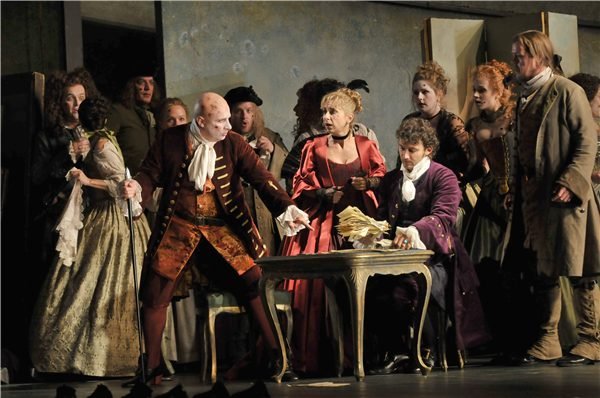|
|
|
|
|
|
|
|
| Post-Bulletin, Rochester |
| Jay Furst |
Massenet: Manon, Chicago, 27 September 2008
|
'Manon' is opera on the grandest scale
|
|
|
 The Lyric Opera's production of "Manon," nearing
the end of its run in downtown Chicago, is opera on the grandest scale --
grandiose in ambition and deeply entertaining, with dazzling talent on stage
and off. The Lyric Opera's production of "Manon," nearing
the end of its run in downtown Chicago, is opera on the grandest scale --
grandiose in ambition and deeply entertaining, with dazzling talent on stage
and off.
Directed by David McVicar, this production of the late Romantic classic by
Jules Massenet has everything: glittery French Baroque decadence, romance,
an almost verismo realism at times and surprising burlesque touches.
And it has Natalie Dessay, the reigning French queen of sopranos, who's all
you might expect and more. Just as impressive is the young German tenor
Jonas Kaufmann, who powerfully conveys both the pleasure and torment of
being smitten by Manon.
"Manon" is the story of a likable young French provincial woman, circa 1721,
who simply wants what she wants. While she's not exactly sure what that is,
she clearly enjoys the attention of men and "dislikes depravation," as her
lover, the Chevalier des Grieux, says ruefully late in the game. Manon is
sought after by men who want to buy her favors; by her cousin, who sees
advantages in keeping her close; and most certainly by Des Grieux, who comes
to grief because of his almost heroic love for her.
Massenet wrote "Manon" about 25 years after Verdi wrote "La Traviata," and
it covers a lot of the same ground. There's no comparison, however, between
the complexities of Manon and Des Grieux, and the more easily sketched
lovers in Verdi's opera. McVicar and conductor Emmanuel Villaume make sure
that none of the composer's subtleties are lost, and though it runs 31/2
hours, it's riveting and has an inexorable forward motion.
Dessay captures the full arc of Manon's tragic story, from innocent,
fun-loving 16-year-old to depraved, fun-loving floozy. It's easy to turn
"Manon" into a morality play or to romanticize her end. Just as often, stage
directors give us all the glitter of Louis XV's court but none of the gritty
corruption of Manon's world. McVicar's staging, with a fantastic set and
costumer design by Tanya McCallin, gives us both -- glitter and glamour as
well as rawness and vulgarity. The Act Four casino scene is one of the
kinkiest presentations you'll see on an opera stage short of "Salome"; it
drives home the point of how low Manon has fallen, though she doesn't quite
know it yet.
There's no more dazzling performer in opera than Dessay, who was Lucia for
the Metropolitan Opera and became the face of the Met in all its marketing
last season. The Lyric might have tried the same thing with Dessay; this
production is every bit as stunning as the Met's "Lucia."
It's hard to decide whether Dessay is a more phenomenal singer or actress;
at times in her low range, her voice seems to lack power and character, but
then she'll soar effortlessly into high, ruthlessly coloratura lines and
generate such passion and volume that any doubts about her greatness are
erased. Throughout, she's simply an astonishing actress. The Act Two
recitative and aria, "Adieu, notre petite table," sometimes come across as
insipid; with Dessay, it's profound and heartfelt, and ends with the tiny
singer pitifully curled up on the "petite table."
Paired with Kauffmann, who's making his role debut as Des Grieux, Dessay
is unforgettable in the Act Three duet at St.-Sulpice, where Manon tempts
him away from his career as a man of the cloth. Here and throughout the
production, there's a frankness and crudity regarding sex that would be
considered almost pandering if it weren't for the show's more profound
purposes.
Kaufmann has an attractive and affecting tone in quieter moments such as
the dreamy love aria, "En fermant les yeux," but is almost shockingly
effective in more forceful passages such as the casino scene where he tells
Manon he inevitably loves and despises her -- which in the end we come to
realize is true of Manon herself.
All the singers in major roles deserve mention here: Christopher Feigum is
pitch-perfect as Lescaut, the brother no girl should have; Raymond Aceto is
appropriately grave and powerful as Des Grieux's father; Jake Gardner brings
forward the vital role of De Bretigny, and David Cangelosi is a fantastic
Guillot, both a fop and a truly despicable character. |
|
|
|
|
|
|
|
|
|
|
|
|
|
|
|
|
|
|